

video about 2023 Delaware Ag Week: youtube.com/watch?v=1xwftQlvhVI
Delaware Ag Week
January 30, 2023
UD research plays prominent role in shaping future of agriculture
Whatever terms they prefer — farmers, growers, ranchers or producers — the individuals who operate within the many disciplines of Delaware agriculture relish their role as early adopters of innovative ideas and practices. The University of Delaware plays a critical role in encouraging that innovation.
Nowhere is embracing innovation more evident than at Delaware Agriculture Week, an 18-year-old educational tradition spanning three large buildings at the Delaware State Fairgrounds complex in Harrington, Kent County. The venue is where family farmers, industry professionals and certified crop advisors gather each January to receive the latest in field research and new recommendations to place in practice and earn continuing education credits.
Delaware Ag Week exists through the sponsorship of the Delaware Department of Agriculture and the two land grant institutions that comprise Delaware Cooperative Extension — the University of Delaware and Delaware State University.
The information delivered to the agriculture community earlier in January is crucial to the success of Delaware’s largest economic driver. Agriculture’s economic impact in Delaware exceeds $9 billion, and both directly and indirectly employ more than 122,609 in the First State, according to a 2022 economic impact study. When agriculture succeeds, so does the First State.
University expertise
UD experts and graduate students from the College of Agriculture and Natural Resources (CANR) played a prominent role as presenters, moderators or session chairs. The information gleaned over the four-day event delivered practical knowledge and new ideas.
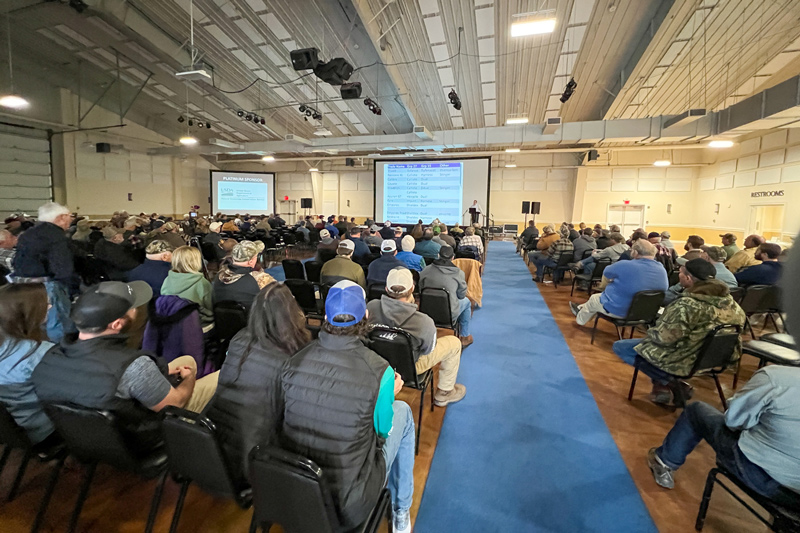
Kevin Evans, owner of Evans Farms, with 2,500 acres of produce, grain and processing vegetables in Sussex County, makes a point to attend as many sessions as possible. A third-generation farmer, Evans brings new ideas back to his farm.
“It’s important to come each day and try to learn anything that Extension has done through some research projects that maybe we can pick up and implement on our farm.”
Evans received specific insights about slugs, a troublesome pest that caused damage to three soybean fields this year. At Ag Week, Extension entomologist David Owens shed some light on the issue.
“Our trenches in some areas weren't filled as well as they should be, and Owens said that was probably a great habitat area for the slugs to start,” Evans said. “So that is why we’re going to go back to the drawing board and change up our potential closing system and do a better job that helps with the slug pressure.”
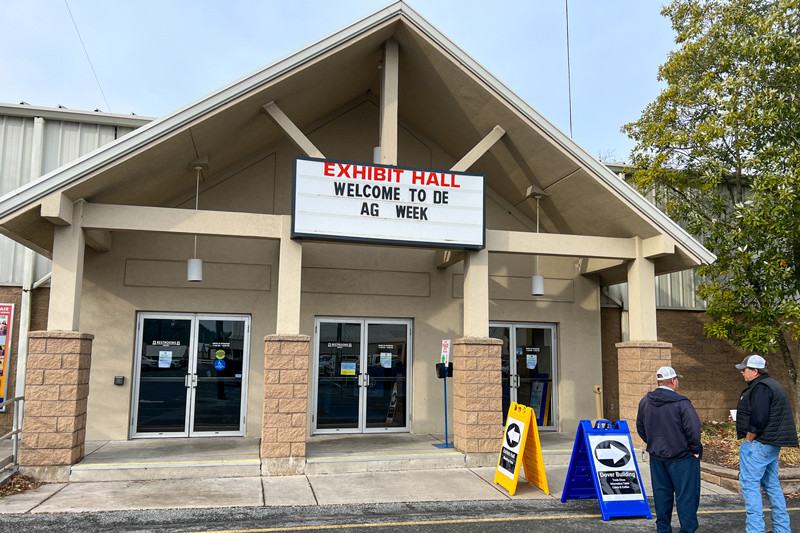
Patti Webb is the coordinator at the Conservation Reserve Enhancement Program (CREP) at the Department of Natural Resource and Environmental Control.
“The University of Delaware Cooperative Extension folks are the conduit between the University education system and all the new technologies that are coming out,” Webb said. “They’re the folks who take that information and share it with us in the field. That is how we keep current.”
Clay Vincent, a fifth-generation farmer and prominent watermelon farmer from the Laurel area, has attended Delaware Ag Week from the beginning as a farmer and an exhibitor for his family's irrigation business.
“It's a chance for us to learn new technologies and what new regulations there are because they do change and we need to know what they are so we can abide by them,” Vincent said. “There’s a tremendous amount of information here for the farmer and then the trade show, which gives the farmer access to new vendors who could offer them something that might benefit them.”
UD students appreciated the occasion to interact with the farming community. Vanessa Richards, a doctoral student researching soybean bradyrhizobium, a nitrogen-fixing bacteria, found it valuable to present at the agronomy session.
“It is helpful for students like me to share with farmers, talk to them, discover their needs,” Richards said. “Spending so much time in the lab, doing research, it is nice to branch out and talk to the people who will benefit from what I am doing.”
Long-lasting relationships formed
The attendees, averaging 300 each day, valued in-person networking. The opportunity to gather and offer feedback is essential for the event’s continued success.
“Networking is really a tremendous value to us,” said Vincent. “For the most part, we’re working every day. You know, we’re on our farm. We are not in a setting like this where all this information is readily available. This gives us a chance to walk through, talk to different vendors and learn about something new, what’s evolved, what is coming, or another source for inputs and equipment. Networking is a tremendous part of this and always has been.”
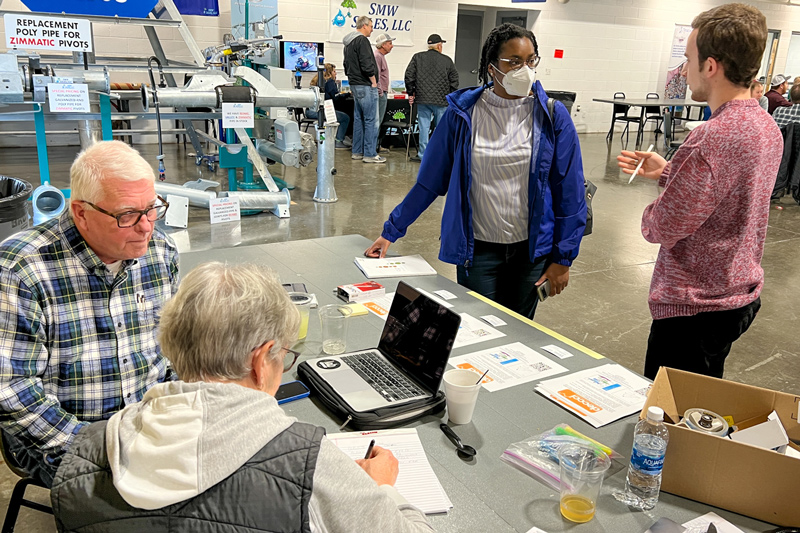
Patti Webb agreed. “At an event like Delaware Ag Week, you get to work with people who have done those techniques or developed those techniques. If you have specific questions, problems or concerns about the new technology, you get to talk with them one-on-one. You get to know them, get their email, phone number and the communications happen quickly and immediately.”
Evans said the conversations lead to action that can’t always be planned.
“I sat with one farmer after the sessions,” Evans said, “and we both talked about our notes, what we did this season with the speaker, and we picked up on a couple of things, what we were doing, what he was doing, exchange notes about what we saw was best and what would work on our operation.”
Early adopters of innovation
The multi-generational audience reflected a powerful legacy of continual knowledge and growth. You can teach an older farmer new tricks. While older generations and traditions are revered, all eyes look to the future. Few at Delaware Ag Week farm the way their grandparents did. Even the old guard knows better than that.
They’re paying attention to the advice. UD experts straddled hot topics when introducing a SmartClimate Agriculture talk that offered adaptation and mitigation strategies for farmers to consider and alter accordingly. They heard how two cover crops, rapeseed and mustards, can be incorporated back into the soil and serve as a biofumigant — an effective deterrent to persistent disease pests like pythium and phytophthora.
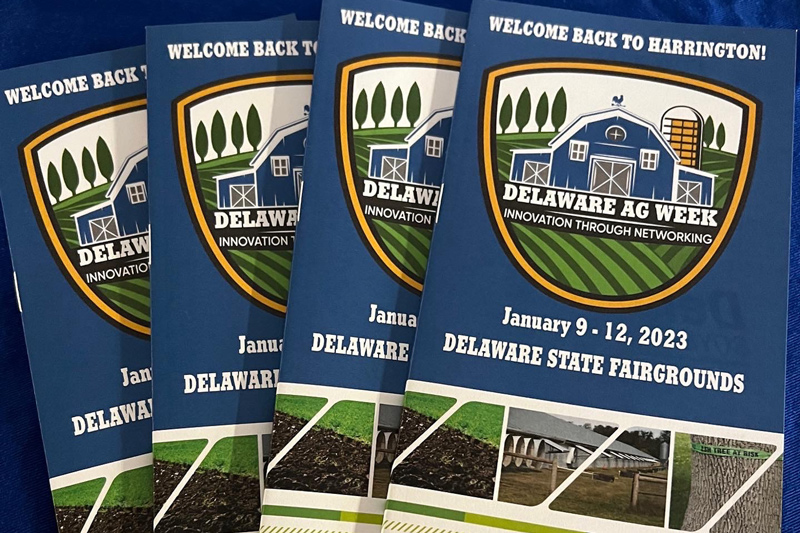
Audiences heard there is no such thing as zero risk when considering food safety. A thin knife cut on a stainless steel surface can harbor dangerous bacteria. Small backyard flock owners and commercial poultry growers paid close attention to biosecurity steps needed to prevent the spread of avian influenza. Several sessions reinforced integrated pest management. By scouting and reaching an observable threshold first, the need to spray is eliminated unless insect pressure exceeds recommendations
All told, Delaware farmers spray less, yield more, test out new timings, measurably improve water quality, switch to varieties that use fewer resources and think about bee health and encourage pollinators to boot.
Delaware farmers have a history of adopting change. They were among the first in the nation to adopt nutrient management practices, which Extension has taught for the past three decades. Years before a federal mandate, growers eagerly attended food safety programs. They pride themselves on their land stewardship and speak with their wallets, investing hundreds of thousands of dollars in precision agriculture, energy and irrigation equipment. When science is solid, farmers welcome the change.
Vincent said he s concerned when he hears some factions of the general public label farmers as polluters.
“The more we learn, the better job we do,” Vincent said. “I drink the water that comes from the well on my farm. I will not jeopardize what my family and I drink. It does matter as stewards of the land that we leave it in as good if not better shape than when we found it.”
The 2023 Delaware Agriculture Week’s return to Harrington was poignant, personal and purposeful.
“You can’t put a price tag on networking and learning,” Evans said. “The biggest thing I learned with farming each year is, if you're not picking something up and progressing, you are going to stay stagnant and you are not going to grow.”
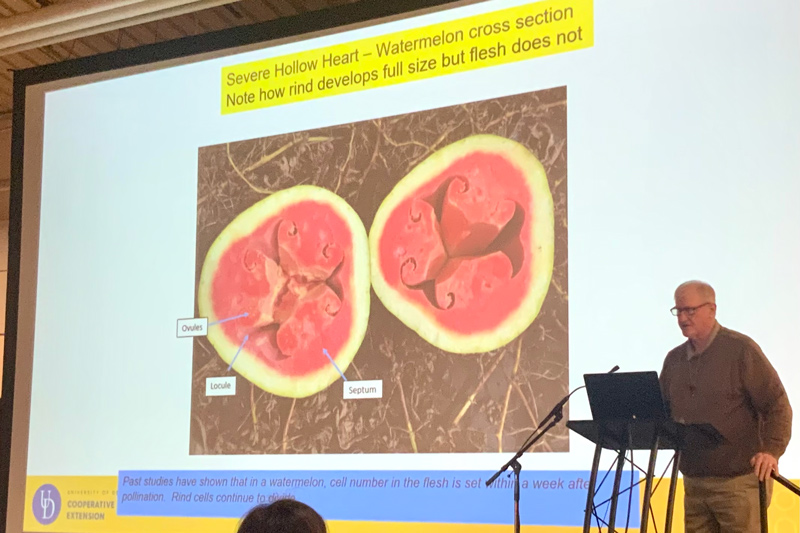
Contact Us
Have a UDaily story idea?
Contact us at ocm@udel.edu
Members of the press
Contact us at 302-831-NEWS or visit the Media Relations website

